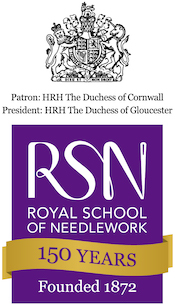Read all about RSN Degree Graduate Sabina Lima’s experience on being awarded by Queen Elizabeth Scholarship Trust, and a place on the Professional Development Programme – a programme created in partnership with Cockpit to help the new QEST Scholars to build the core skills needed to develop their business.
“It’s an amazing feeling having my work recognised by both QEST and the Worshipful Company of Cordwainers – the sponsor of my scholarship. And knowing I’m the first degree alumni receiving this fantastic opportunity!
I will use the scholarship in my pursuit of excellence in the craft of shoemaking, focusing on two main areas: practice and research. It will be a mixture of one-on-one training under the tutelage of master shoemaker Mr. Daniel Wegan at his workshop in Kettering and study visits to museums in the UK and France to research and analyse shoe designs.
The opportunity to be trained by Mr Daniel Wegan truly is a privilege, a once-in-a-lifetime chance that I won’t pass up. His coaching style and the ability to observe him at work on a regular basis is invaluable. Apart from his mastery, his passion and respect for the craft is on clear display.
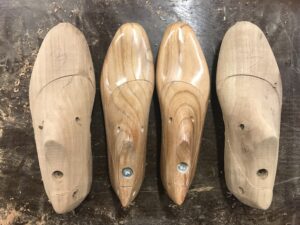
I embarked on the journey of learning this craft even before enrolling in my degree in Hand Embroidery at the RSN. In fact, in my statement letter submitted in 2018 as part of the RSN degree application, I mentioned that my aim was to combine in the future the disciplines of hand embroidery and shoemaking.
While I was doing my degree at the RSN, I experimented with applying hand embroidery in a broad range of different areas and scales, such as fashion, wearable art, acoustic panels for interiors and art installations for interiors and in an urban context.
When I had the chance to test my abilities in the area of shoemaking, I grabbed the opportunity and gave it my best. As a result, in 2020, I won 1st prize in the Dave Xavier Award, an international shoemaking competition promoted by the Independent Shoemakers Conference. In the same year, my design and embroidery sample for the luxury shoe brand Sheme was selected and was put into production.
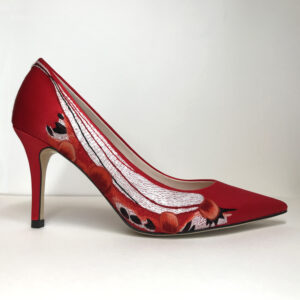
Although it was not possible to dedicate the same amount of time to shoemaking while doing the RSN degree in hand embroidery, my focus hasn’t shifted. Since 2017, I have been doing courses with different master shoemakers, covering specific areas of this craft such as lastmaking – where the client’s foot is measured, and it is transposed to a wooden block that is gradually shaped until the perfect shape of the client’s foot is achieved.
I also learned a few styles of pattern cutting, closing and the making itself– both cemented and handsewn shoes in different types of constructions. I have been gradually practicing shoemaking for the last 6 and a half years.
Hand sewing a pair of shoes requires more than 200 individual steps, and it can take as much as 120 hours to complete one pair. Different from hand embroidery, when a stitch can be unpicked when it’s not correctly done, with shoemaking most of the steps are unforgiving, meaning every step has to be perfect. If not, the subsequent steps – and thus the final quality – will be compromised.
One wrong hole in the leather, or at a wrong size; a stitch pulled without the correct tension are all noticeable and a clear testimony that the craft is not mastered. So, practice and repetition of each step is essential in acquiring the necessary skills and techniques to produce at the highest level.
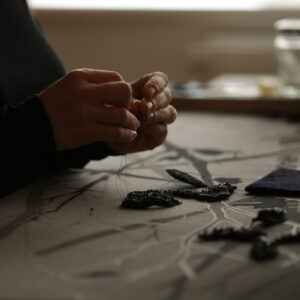
I decided to apply to QEST as I share the same values and appreciation for craftsmanship as this institution does. I feel I have come far in developing my skills in hand embroidery and think it is the right moment to take the next step. Advancing the skills and perfecting the shoemaking technique with the best master shoemaker in the UK, and considered one of the best in the world, was a stroke of lucky timing and opportunity.
As the QEST application process is highly competitive, it took a lot of time to make sure I was well prepared. By that I don’t mean only the professional information you need to compile and a strong body of work within the field to be selected. But also time to meet, discuss and planning the training with the chosen master craftsman. And reaching out to established professionals that are willing to write reference letters, testifying your skills, achievements, and potential.
Luckily, I had the best referees anyone could ask for. I got two letters to support my hand embroidery skills, one written by Ms Diana Springall – a textile artist that needs no introduction. She was my mentor at the Hand and Lock Prize for Embroidery in 2021 and one of my Sentient panels from that exhibition is now part of her private collection.
The second letter was kindly written by Ms. Justine Bonenfant, also my mentor at the Hand and Lock Prize for Embroidery in 2022 and hand embroiderer tutor in my second year at the RSN degree course.
The third letter comes from the master shoemaker Mr. James Ducker, from the Carréducker Shoemaking School, a place where I have been learning the craft on a part time basis over the last 5 and a half years by both Mr. James Ducker and Ms. Deborah Carré.
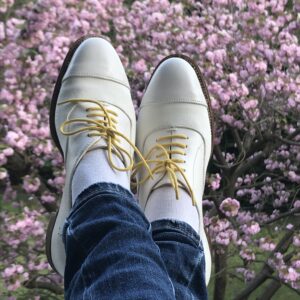
My goal is to create impressive haute couture embroidered shoes that are designed and constructed entirely by hand, using the highest quality materials and techniques. This means that the shoes created under my brand will be one-off pieces, as they will be made specifically for the individual client and will reflect a combination both the client’s unique tastes and requirements, and my artistic style.
At the end of the QEST Scholarship, I will start creating shoes to showcase my ideas of how to do haute couture embroidered custom-made shoes to promote my own shoemaking business.”
Follow Sabina’s shoemaking journey on Instagram: @sabinalima_shoes and @sabinalima_embroidery
